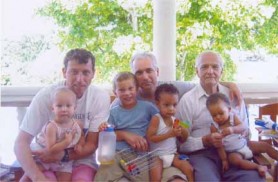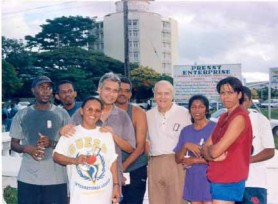By Brendan de Caires
Towards the end of his life, despite failing health and a workload that would tire men half his age, David de Caires decided to repair the Camp Street Avenue. A naturally reticent man, he found it exquisitely awkward to ask strangers for money and without the sustained goodwill of the local community he could never have endured the barbecues, T-shirt sales and other nuisances which fundraising required. Once committed to this quixotic scheme, however, he pressed on with his usual tact until there was enough money to proceed.
Constrained throughout by a modest budget, the project needed, and found, charitable professionals. Architects and engineers gave dozens of hours of work pro bono, and sometimes donated skilled labour at their own expense. A handful of local businessmen gave generously and at least one person who no longer lived on the street made a large, anonymous donation. In a surprisingly short time, proper drainage was installed, the walkway resurfaced, and new streetlights and benches set down next to the freshly-weeded and well-mown parapets. After months of hard work the first phase was over. Although their efforts ended more in exhaustion than triumph, the Camp Street committee allowed themselves a smattering of pride in what had been achieved.

Within a week, someone had defaced the commemorative plaque. Soon afterwards others had ripped benches away from their moorings, toppled a concrete pillar, and perpetrated half a dozen other acts of petty vandalism. Baffled, but determined, the committee made the necessary repairs. Replacement benches were set in concrete and the fallen pillar was restored. More destruction ensued, and further repairs. On it went for several years until a dynamic equilibrium established itself between the avenue’s restorers and its inexhaustible saboteurs.
As with the avenue, so with Stabroek News. When, in 1985, the Founder Leader’s sudden death offered a fleeting chance of press freedom, my father jumped into newspaper publishing without any of his usual circumspection. To those who knew him well, this leap of faith was neither reckless nor out of character, it was simply the act of a man who had reached the end of his tether. Exhausted by the Sovietisation of the state media under Burnham, he understood that free speech was a sine qua non for lasting political progress in Guyana. Much later, he was stimulated by the philosopher Jürgen Habermas’s vision of how disinterested intellectuals could maintain a healthy public sphere by keeping debates factual and relevant. But those sorts of ambitions lay far in the future. Stabroek News was born out of a simple conviction that civil conversation in this country had gone silent for far too long.
My father believed that Guyana’s arrested political and cultural development could only be cured by collective truth-telling. Silenced by an electoral reality that dared not speak its name, too many African Guyanese had either learned to live with an illegal government, or emigrated. Cheated, intimidated and ineptly led, Indian Guyanese faced equally stark options: to resign themselves to political marginalization through rigged elections – a situation unlikely to improve during the cynical Cold War years – or join the mass exodus to expatriate communities in Britain, Canada, the US and beyond. He never seriously considered that any Guyanese in their right mind would willingly revisit the racial conflicts of the 1960s, but he often feared that an appetite for violent confrontation would eventually overwhelm us all.
A lifelong believer in the power of open societies to heal themselves, my father never gave up the hope that we could redeem our political insecurities. But he died close to despair at how little progress we had made since Independence. Although he was always proud to say he was Guyanese, in any context, during later life he felt thoroughly ashamed and disappointed by what this country had become.
Deeply imperfect though it may be, at its best this newspaper has shown a generation of Guyanese that a few resolute people can create a public space where ideas are exchanged freely. When these ideas have stirred the public’s interest and the letter columns have hummed with impassioned opinions on the proper way to develop infrastructure, set water rates, or modernize the army and police force, the newspaper has lived up to its hopeful origins.
My father took a particular interest and pride in the letters pages, and edited them conscientiously almost up to his death. He felt, and often said, that any public debate which stuck to arguments instead of indulging in racial and political bickering was a healthy change from the way things had been. Over the years, Stabroek News has provided dozens of these debates. In doing so, it has offered a glimpse of how the public conversation in this country might still solve some of the political riddles which have beset us for so long, and how we might brood upon the pathologies of postcolonial failure without being consumed by them.

In spite of a long decade at boarding school and university, I was lucky enough to know my father well, as well as anyone else, except his childhood friends and law partner Miles Fitzpatrick. Out of many amusing anecdotes that he shared with me, I remember two with particular fondness. As a novice gambler – a condition he spent a lifetime correcting – he once wagered all of his half-term pocket money on a strong favourite named Gentleman Jim, in a jumps race at Brighton. Lulled into a false sense of security – the punter’s cardinal sin – he watched in horror as the horse slipped after clearing the last hurdle, well clear of the field, and failed to finish. Having squandered all his funds on this rash act of faith, he was forced to walk back to the boarding-house he was sharing with other West Indian students, instead of taking the train. A philosophical walk, in retrospect, one that convinced him of the moral superiority of the second-favourite – the linchpin of all his subsequent gambling – and also of the need for lasting revenge against the diabolical confraternity of bookmakers who had profited from this tragedy.
The other story is about cricket. When he attended Stonyhurst, a Jesuit boarding school in Lancashire, he bitterly disappointed the coaches who thought he might live up to his father’s high athletic standards. Nevertheless, he managed to make it onto the college first XI. Not known for the quick single, he tended to play conservatively and wait for balls he could hit hard. But on one memorable occasion, he was at the crease when the Bishop of Burnley was charitably allowed to try out his spin bowling. Instead of a polite forward defence to the bishop’s long hops, he dispatched each delivery to a different part the ground, lofting the ball over the boundary with Byronic abandon. This lapse of judgment was much to the prelate’s chagrin and embarrassed his Jesuit hosts. With their usual swiftness, the priests had their revenge. A suspect lbw decision was given and the batsman was sent off to the dressing room. As he sat there, unbuckling his pads, a senior Jesuit came over to admonish him. “de Caires,” he said (mispronouncing it ‘dekayres’, as was their wont), “today you behaved like a Yahoo!” Although he was stripped of his first-match colours for this incident, the glorious anarchy of that single over remained for my father a personal symbol of what freedom and self-determination ought to be.
The pattern for much that came later was established during his long, difficult education under the Jesuits. The transition from a pampered middle-class Georgetown existence to the rainy solitude of Blackburn and environs disabused him of the illusion that life might turn out happily if left to its own devices. Like his father before him, and myself many years later, he learned the joys and stresses of life among strangers. He also came to prize individual freedom, loyalty and a strong character above all else. Although he was a shy student, after the enforced camaraderie of boarding school he learned the absolute necessity of moral and intellectual independence. And for the rest of his life he never followed a multitude to do evil. In this, and much else he was ineradicably Catholic.
But it would be wrong to suggest that my father was driven by any sort of simple faith. He was much more complex than that. For example, although he was unequivocally anti-Comnunist, he was fascinated by Marx, deeply read in the history and thought of the Left, and counted several Communists and former Communists among his closest friends. He never translated ideological differences into personal judgments. Racial differences were also irrelevant to him. Engaged to an African Guyanese in his youth, and later married to an Indian, my father remained refreshingly immune to the racial insecurities of either racial group. In later life I was always surprised by the number of wrong opinions attributed to him. Mrs Jagan, for example, once insisted to me that he clearly had a personal animus against the PPP; President Hoyte was also foolish enough to publicly denounce him as an elitist and a provocateur. Nonsense like that, and other bizarre guesses at his closet sympathies – of which there were none, to my knowledge, apart from a personal fondness for several leading members of Guyana’s least electable party, the WPA – were an unavoidable part of public life. While some of these smear tactics annoyed him, he never took any of it to heart. Whenever I raised the subject, he told me that an editor has no friends. Inspired by the courage of the legendary political commentator IF Stone, my father was always content to be a minority of one.
My father was a devoted parent and the moral compass of our family. A year after his death we are still coming to terms with the loss. In his absence, musing over the meaning of his life, I have seen more clearly than ever why he devoted twenty years of his life to the creation of an independent newspaper. Nation building and the creation of a civil society take time; more time than he had. But both rely on a profound respect for disinterested free speech, the kind of speech that a newspaper of record like Stabroek News aspires to. By itself free speech cannot overhaul our political failures – only engaged citizens can do that. But the cultivation of civil conversation and of debates that are factual, balanced and reasonably courteous, are at least one small step in the right direction.




